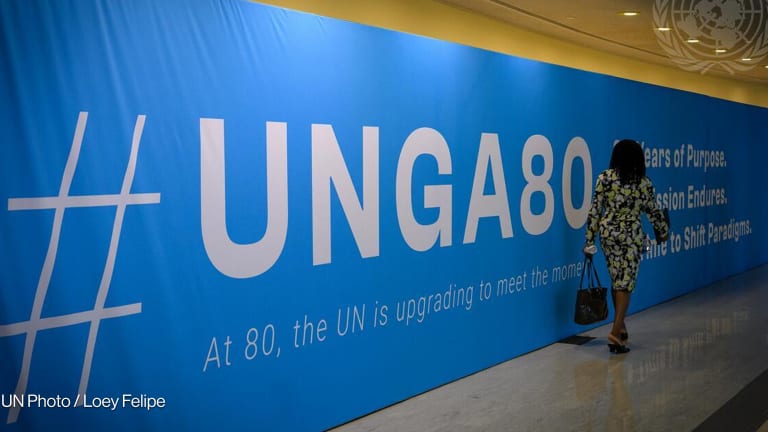
NEW YORK — In his speech to the United Nations General Assembly on Tuesday, United States President Donald Trump alluded to an effort his administration is pursuing that has raised concerns within the U.S. global development community.
Trump expressed his disapproval of the current relationship between the U.S. — the world’s largest foreign aid donor by volume — and the countries that receive its assistance.
“The United States is the world’s largest giver in the world, by far, of foreign aid. But few give anything to us,” Trump said.
That broad complaint served as the basis for the first public acknowledgement by the administration of a major review process currently underway to reevaluate how the U.S. decides where it should allocate its foreign aid money.
“We are taking a hard look at U.S. foreign assistance,” Trump said.
“That will be headed up by Secretary of State Mike Pompeo. We will examine what is working, what is not working, and whether the countries who receive our dollars and our protection also have our interests at heart. Moving forward, we are only going to give foreign aid to those who respect us and, frankly, are our friends,” Trump said.
Members of the U.S. development community have been struggling to track down details about the Trump administration’s foreign assistance review for weeks. Some of them had previously worried the president might highlight the review at the U.N. before development professionals had any chance to weigh in.
“I am hoping that nothing from this foreign aid review shows up in his remarks,” George Ingram, a senior fellow at the Brookings Institution told Devex last week.
The effort was previously being spearheaded by a member of Trump’s National Security Council, Kevin Harrington, deputy assistant to the president for strategic planning, the Washington Post reported Tuesday.
The decision to transfer responsibility of the review from Harrington to Pompeo came as a surprise to at least a few administration officials who heard about it for the first time in Trump’s speech — and who spoke to Devex on condition of anonymity.
In an interview with Devex following his remarks at the Concordia Annual Summit in New York on Tuesday, U.S. Agency for International Development Administrator Mark Green expressed confidence that his agency’s recommendations would factor into discussions about the criteria for determining where the U.S. spends foreign assistance dollars.
“What we can do is we can serve to be the voice of development and bring forward what it is that we see and what the numbers show us. We recognize that there are always other considerations,” Green said.
Green also voiced his approval of Pompeo’s leadership of the process, citing a “great working relationship” with the Trump administration’s top diplomat and his admiration for Pompeo’s “leadership style.”
“In many cases — as in this case — he’s the decider,” Green said. “But I know that I will have a chance to talk with him, show him what it is we’re doing, and I trust his judgement. So I’m very comfortable having Secretary Pompeo lead this.”
Trump’s message about the purpose of foreign aid — compelling countries to consider America’s interests — struck a discordant note in a speech that otherwise emphasized national sovereignty and leaders’ responsibility to act on behalf of their own citizens.
“We believe that when nations respect the rights of their neighbors, and defend the interests of their people, they can better work together to secure the blessings of safety, prosperity, and peace,” Trump said close to the beginning of his remarks.
Some aid advocacy organizations took issue with the basic premise of Trump’s message.
“America’s poverty-fighting foreign assistance programs are designed to help the world’s most vulnerable people, not to be used as a bargaining chip with the governments that represent them,” Ian Koski, senior director of communications for North America at ONE Campaign, wrote in a statement.
“U.S. foreign assistance is not the President’s personal charity. It is from the American people and an expression of our values that is meant to transcend politics and petty grudges. Such vindictive antics might be intended to score short-term political points, but they will cost dearly for the most vulnerable among us,” wrote Abby Maxman, president of Oxfam America.
More on UNGA 2018:
► Guterres launches new plan for SDG financing, as private finance takes the spotlight
► UN warns of worsening famine in Yemen
► Q&A: A new, UN-backed global fund to support former child soldiers
While Trump did not explicitly identify what he would like in return for America’s foreign assistance programs, he has offered hints in the past. In his State of the Union address in January, Trump called on Congress to pass legislation that would ensure U.S. assistance only goes to “friends of America,” and pointed to U.N. voting records as one potential measure of that friendship.
The White House is also concerned about countries that it believes receive U.S. foreign aid with one hand, and then accept unsustainable amounts of financing from China with the other, The Washington Post reported. Earlier this month, a USAID official described a more proactive and aggressive approach that will guide the agency’s efforts to compete with China for development influence and partnerships.
Unlike his speech at the U.N. last year when he mentioned the President’s Emergency Plan for AIDS Relief, the Women Entrepreneurs Finance Initiative — which his daughter and adviser Ivanka helped create — and a few other initiatives, Trump did not take the opportunity to highlight any particular U.S. global development programs.
That is despite the fact that the creation of a new U.S. development finance initiative — considered by many aid experts to be one of the most significant development policy achievements of the last two decades — stands on the brink of achievement. That institution’s supporters have portrayed it as a key tool for countering China’s influence in developing countries.
NCDs. Climate change. Financing. Read more of Devex's coverage from the 73rd U.N. General Assembly here.








